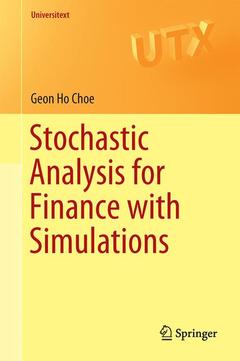Description
Stochastic Analysis for Finance with Simulations, 1st ed. 2016
Universitext Series
Author: Choe Geon Ho
Language: English
Subject for Stochastic Analysis for Finance with Simulations:
Support: Print on demand
Description
/li>Biography
/li>Comment
/li>
The author's main interests are simulations of random phenomena in the areas of quantitative finance, random number generators, dynamical systems theory, and information theory. He has published a book titled "Computational Ergodic Theory".
Presents the mathematical methods required for pricing financial derivatives
Encourages hands-on experience and builds intuition by explaining theoretical concepts with computer simulations
Covers mathematical prerequisites, including measure theory, ordinary differential equations, and partial differential equations




